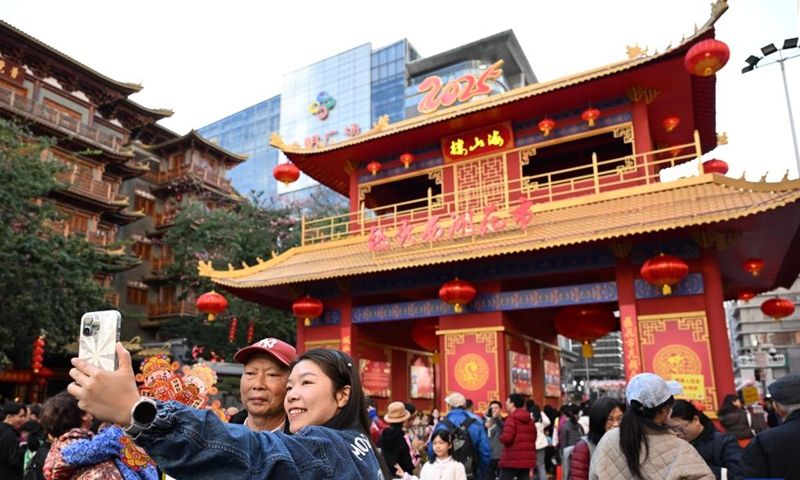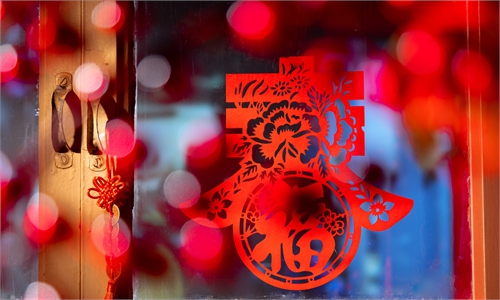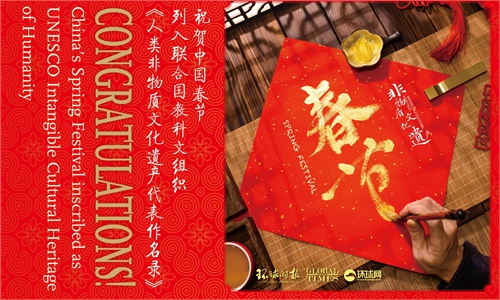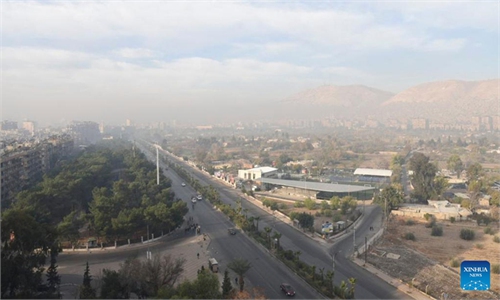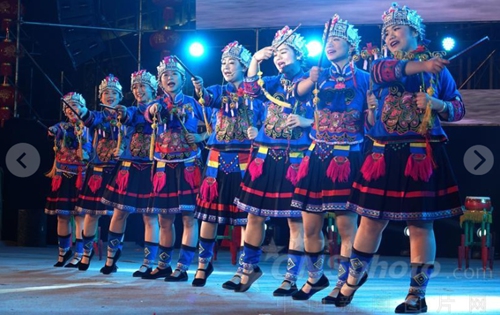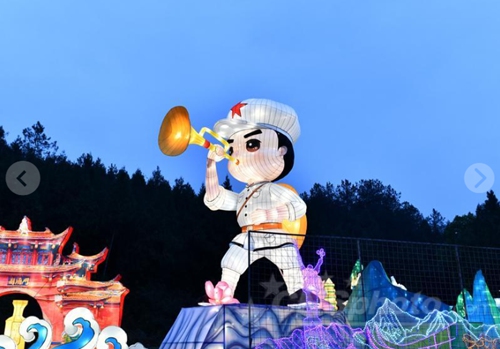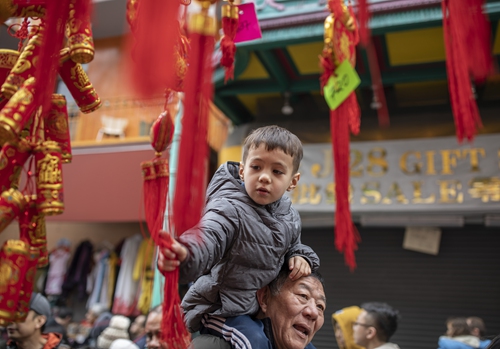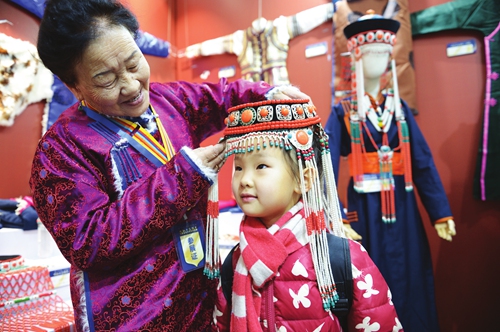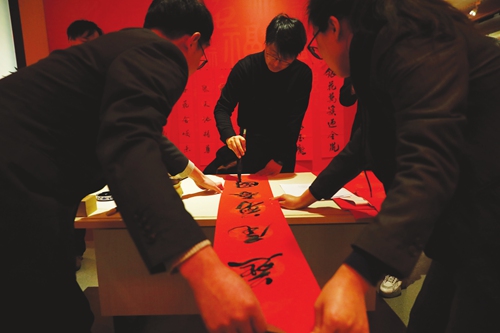Tourists pose for a selfie at a flower market in Yuexiu District, Guangzhou, south China's Guangdong Province, Jan. 27, 2025. China is alive with vibrant celebrations with the Spring Festival just around the corner. (Xinhua/Deng Hua)
With traditional fairs and shopping and travel booms over this year's extended holiday, China is about to ring in the Spring Festival of the Year of the Snake, the first since its inclusion into the UNESCO intangible cultural heritage list.
For Chinese across the world, the Spring Festival is a time for family reunions, festive traditions, holiday shopping and diverse cultural and tourism activities. This year, it falls on Jan. 29 with hundreds of millions of people traveling to reunite with families in the world's largest annual human migration.
Celebrations today highlight both traditional and modern elements, from temple fairs, lantern displays, lion dances and intangible cultural heritage bazaars to village galas, light and drone shows, museum exhibitions, and travels at home and abroad.
This year, festive glee and activities are further boosted by the UNESCO recognition, pro-consumption policies and the extension of the traditional seven-day holiday by an extra day.
FAMILY REUNIONS AND TRADITIONAL FESTIVITIES
For migrant workers like Zhang Changfu, a native of Baise in Guangxi Zhuang Autonomous Region, south China, the Spring Festival offers a rare opportunity for a family reunion.
"I've been working away from home for 20 years, but I return home every Spring Festival," said Zhang, 41, who works as a machinist in the southwestern metropolis of Chengdu, adding that he is looking forward to taking his family to the local temple fair.
The temple fair, a panoply of folk performances, local delicacies and traditional handicrafts, is a familiar sight at this time of year. While such activities contain more traditional elements in the countryside, large cities like Beijing and Shanghai have a tradition of holding large-scale fairs.
For others, like Lin Jia who works in Nanjing, capital of east China's Jiangsu Province, Spring Festival is the perfect time for a family tour. Lin's parents and grandmother have traveled from Hunan Province to join her for the holiday.
Lin plans to take them sightseeing around the city after a New Year's Eve dinner at a hotpot restaurant. "It's both a reunion and a mini vacation," she said.
This year, many cities are holding more traditional festive activities, motivated by the inscription of the Spring Festival on UNESCO's Representative List of the Intangible Cultural Heritage of Humanity in December. The southwestern megacity of Chongqing has planned more than 100 intangible cultural heritage exhibitions, bazaars and performances during the holiday.
"We hope visitors can feel the strong festive ambiance and the special charm of our cultural heritage," said Tang Mao, the organizer of a cultural heritage bazaar in Chongqing's bustling Jiefangbei commercial area, where over 40 artisans display traditional crafts like paper-cutting, New Year picture drawing and sugar-figure making.
HOLIDAY SHOPPING
For centuries, shopping has been a crucial part of Spring Festival preparations: from nice food to new clothes and carefully chosen gifts.
Liu Fengmei, a woman in her 70s in Shanghai, traveled over an hour by subway to First Foodhall, a time-honored food store on the iconic Nanjing Road, to stock up on traditional holiday snacks.
A long queue is seen outside the store, which, like many across the country at this time of the year, is filled with festive decorations and a dazzling array of traditional foods.
Following the UNESCO recognition, Chinese consumers also appear to be particularly interested in goods with a cultural festival flair.
Li Gang with the Ministry of Commerce said sales of neo-Chinese-style jewelry and goods featuring intangible cultural heritages have grown by 52.6 percent and 26.6 percent in the month-long online shopping event for the festival initiated by the ministry.
In recent years, the Spring Festival shopping lists have included more imported goods, reflecting Chinese people's rising purchasing power and growing appetite for imported quality goods.
Earlier this month, a cargo ship loaded with 20,000 tonnes of Chilean cherries arrived at the Nansha Port in south China's Guangzhou, perfectly timed to offer a festive treat for millions ahead of the Spring Festival.
"Chilean cherries, Australian lobsters and Russian snow crabs ... the prices of imported products are quite attractive, so I plan to prepare a New Year's Eve dinner that blends both Chinese and foreign flavors," said a customer surnamed Guo at a store of fresh-food chain Freshippo in Beijing.
Driven by government-subsidized trade-in programs, mobile phones, wearable devices, and green and smart home appliances are also highly sought-after items ahead of the festival, according to the ministry.
"Spending on New Year's goods can offer a glimpse into the resilience and vitality of consumption throughout the year," said Hong Tao, director of the Institute of Business Economics at Beijing Technology and Business University, who expects a new wave of holiday consumption growth.
HOLIDAY TRAVEL
In addition to local festivities, many are venturing farther afield to make the most of the eight-day Spring Festival holiday.
Fang Xue, a resident of Shanghai, plans to take her parents on a holiday trip to Shantou, a coastal city in Guangdong Province. "Traveling during the Spring Festival has become quite fashionable," Fang said. "My parents in their 80s are very eager to travel."
The extended holiday has given a boost to the travel industry. While tourist cities such as Shanghai, Beijing, Guangzhou, Hangzhou and Chengdu are attracting large numbers of holidaymakers, smaller cities are also getting more travelers who wish to savor celebrations with local flavors, according to Fliggy, a leading online travel agency.
"Expectations for intangible cultural heritage activities are especially high during the first Spring Festival after the UNESCO recognition," said Wang Liyang, operations manager at Fliggy.
Thanks to China's further easing of visa policies, many Chinese cities are also witnessing an influx of international visitors, with many eager to experience the festival traditions.
"The UNESCO heritage status gives Spring Festival worldwide recognition and increases its appeal to international tourists," said Zhou Huijie, an analyst at Trip.com research institute.
Trip.com Group has estimated that inbound bookings would jump by 203 percent during the Spring Festival, with tourists from the Republic of Korea, Malaysia, Singapore, Japan, the United States, Australia, Thailand and Britain topping the list.
Lukas Muller from Germany is traveling in northeast China's Jilin Province for skiing and to experience the Spring Festival.
"My friends and I will experience Chinese New Year up close, including eating dumplings, putting up spring couplets, setting off fireworks, and many other customs I'm not familiar with yet," he said, also praising China's visa-free policy that facilitated his trip.
Spring Festival serves as the most direct cultural window to understand the Chinese people and it is also a traditional festival with the most Chinese cultural characteristics, said Feng Jicai, a renowned Chinese writer who has long championed intangible cultural heritage protection.

